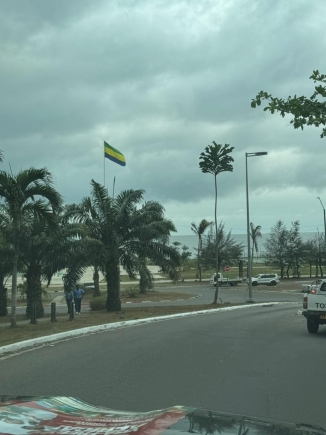We have so far covered 4,118 kilometres - from the bustling streets of Accra in Ghana, through the vibrant cities and towns of Lomé and Cotonou, the megapolis of Lagos, the political hub of Abuja, the coastal charm of Calabar in Nigeria; onward to Kumba, Douala, and Yaoundé in Cameroon; then into the lush landscapes of Ebebiyin, Bata, and Mongomo in Equatorial Guinea; and finally to Oyem, Libreville, Mouila, and now Ndende in Gabon.
Gabon has been a revelation, a beacon of what true African pride looks like. The warmth of the Gabonese people envelops you like the equatorial sun—genuine, unpretentious, and radiating humility.
But it is their unyielding sense of patriotism that pierces the heart. Everywhere we drove, from the bustling avenues of Libreville to the quiet hamlets dotting the countryside, the Gabonese flag fluttered proudly. Commercial taxis, private sedans, buses laden with passengers—all adorned with the green, yellow, and blue stripes of their national emblem.
![]()
In every village we passed, at least one flag was hoisted high, a silent sentinel declaring sovereignty and self-respect. This is not performative nationalism; it is the organic expression of a people who know their worth, who refuse to dilute their identity with foreign symbols. Gabon has impressed me greatly with its high sense of patriotism.
Contrast this with the scenes back home in Ghana, and a deep sorrow wells up within me. One of the most troubling sights in our nation is the proliferation of foreign flags—Israeli, European, North American—plastered on commercial and private vehicles, waving like badges of subservience. Why do we do this?
The Ghanaian flag, with its bold red, yellow, green, and black star, is our identity, our symbol of hard-won sovereignty. It represents the blood of our ancestors who fought colonial oppressors, the sweat of our farmers and workers, and the dreams of our children.
If you cannot proudly display it in your vehicle or home, then you have no business hoisting the banner of another nation. This is not harmless admiration; it is a symptom of mental slavery, a lingering poison from centuries of colonisation that convinces us our own symbols are inferior.
Mental slavery, as the great Bob Marley once sang, is the most insidious form of bondage. It is the chains we forge in our own minds, convincing ourselves that the West’s ways are superior, their cultures more refined, their flags more worthy of reverence.
In Ghana, and across much of Africa, we see it everywhere: in our blind worship of foreign brands, our adoption of alien languages over our indigenous tongues, our preference for Western education systems that erase our history. But the flags are a stark metaphor. They scream our internalised inferiority complex, our unspoken belief that Africa’s colours are not vibrant enough to stand alone. How can we build a united Africa when our people still bow to the ghosts of empire?
I am profoundly proud of the Gabonese for rejecting this mental yoke. Their flags are not just fabric; they are affirmations of dignity, reminders that Gabon belongs to Gabonese, not to distant powers who once carved up our continent like a feast. As we traversed their land, I felt a surge of excitement, a glimmer of hope that this patriotism could spread like wildfire across Africa.
Let us not delude ourselves: this is a one-way street of adulation. In my extensive travels through North America—Canada and the USA—and across 23 countries in Europe, I have yet to see a single American or European flying the flag of an African nation on their car or home. They proudly wave their stars and stripes, their union jacks, their tricolours, unapologetically asserting their identity.
Why? Because they have never been mentally colonised to doubt their own supremacy. They export their culture, their flags, their ideologies, while we import them wholesale, diminishing ourselves in the process. This asymmetry is the essence of neocolonialism—our minds remain occupied even as our bodies are free.
It is time to shatter these mental chains. As a strategy for decolonisation, I strongly recommend a continent-wide ban on the display of foreign flags in public spaces, vehicles, and homes unless for official diplomatic purposes. Let our governments enact laws that prioritise our national symbols, fining those who perpetuate this subtle form of self-erasure. Education campaigns must follow, teaching our youth the history behind our flags, the sacrifices they represent. Imagine an Africa where every vehicle from Cape Town to Cairo bears the colours of its homeland, where villages hoist banners of unity rather than division. This is not censorship; it is reclamation, a bold step toward mental liberation.
Our Trans-African Tourism and Unity Campaign, a government of Ghana backed initiative I lead, is more than a journey—it’s a movement to awaken the sleeping giant that is Africa.
As we continue southward, I urge my fellow Africans: cast off the foreign flags, embrace your own. Only then can we truly unite, build, and thrive as the sovereign people we were meant to be. The road ahead is long, but with minds unchained, no distance is too great.
Ras Mubarak is the lead campaigner for the Trans-African Tourism and Unity Campaign, dedicated to fostering continental unity through a visa-free policy, intra-Africa tourism and cultural exchange.

